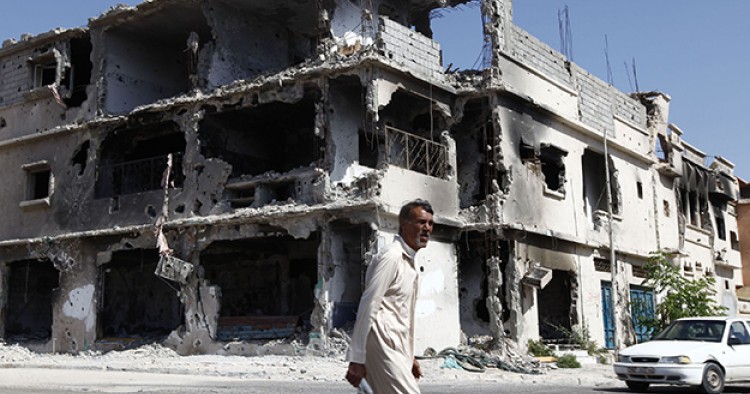After the liberation of Sirte from ISIS, now the really hard work begins. The nine-member Presidential Council (P.C.) and the Government of National Accord (G.N.A.) that it named under Prime Minister Fayez Serraj have yet to receive an affirmative vote from the House of Representatives (H.O.R.) in Tobruk. Although a majority of H.O.R. members were prepared many weeks ago to confirm Serraj and his cabinet, speaker Aquila Saleh declined to bring the matter to a vote. In reality, however, his body’s constitutional authority has lapsed during the interim, and whatever negotiating leverage he might have had earlier has eroded considerably.
The growing belief, true or not, that Saleh is intimidated by General Khalifa Hifter and that the latter depends on Egyptian support, is further draining the H.O.R.’s credibility as well as the government institutions it appointed. The bottom line is: the P.C. and the G.N.A. are the only game in town with hope for becoming national government institutions. Over the long-term, it is not enough for the G.N.A. to have only international endorsement. In post-2011 Libya, however, this kind of arrangement is a promising start. A permanent constitution and elections should follow, but governance must start first.
Improvements in the security environment may be an essential first step, but they are only part of the G.N.A.’s quest to win legitimacy. It will need to build on the nascent cooperation shown in the re-conquest of Sirte by at least beginning the process of bringing allied militia members into Libyan military and police forces. This will require compromises with powerful political forces in eastern Libya, Misrata and other parts of the country. That may even include a role of some kind, however symbolic and temporary, for Hifter, under the authority of a G.N.A. defense minister and a chain of military command to which Hifter is subordinate. The United States will probably need to make this clear to the Egyptian government, if the latter does not quickly see the logic of supporting the international consensus on this point.
Against the odds, the sovereign Libyan national institutions that are so critical to fiscal and economic recovery—the Libyan National Oil Corporation, Central Bank, and Investment Authority—remain intact and, relatively, free from politicization. All three are dealing with international institutions and foreign governments, as well as maintaining contacts with Libyan authorities, sometimes in both Tripoli and Tobruk. This is a great tribute to the professionalism and patriotic commitment of personnel at those institutions. They are laying the bases on which the G.N.A. could resume normal activities and economic life could revive.
That cannot happen fast enough. The Libyan people are running out of patience with their political leaders. Although endorsement from the H.O.R. would be an important development for widespread internal recognition, the G.N.A. will still have to earn legitimacy the hard way: by delivering the goods.
Libyans throughout the country will demand urgent improvements in the provision of electricity and fuel, water and food distribution, minimal police protection for their neighborhoods, reopening of schools, and resumption of health services. As time passes, they will want to see progress on housing and infrastructure developments, and job producing industries. The G.N.A. cannot do all of this at once, but it must choose priorities and start governing in a way that will make positive differences in the lives of Libyans. In many cases, it may be wisest to form partnerships with local institutions that have arisen in the absence of the central government that the Qaddafi regime controlled. The G.N.A. is likely to have funds for renewed governance before it has the human and institutional means to implement decisions on the ground. The clock is ticking.
International institutions like the World Bank, the I.M.F., the U.N.D.P. and other agencies of the United Nations will be essential to providing the Libyan government a framework in which to accept outside advice. Libyans within the country as well as in the diaspora have developed highly advanced skills and experience, and will resent any appearance of neo-colonialism, despite the assistance needed to organize and kick-start effective governance.
The United States has a key role to play in helping to coordinate assistance to Libyan governance and economic development, while it works within the international coalition. Leading from behind is sensible, and others must do their part as well. Libyans must unite in a manner to constitute an effective partner on the ground. They will then have a solid claim for more relief from U.N. Security Council sanctions, which currently fence off most of Libya’s financial assets.
As governance is firmly established, Libya will be able to attract once again quality private sector foreign companies willing to invest in Libyan economic development. The training of Libya’s human resources and provision of experience within the global economy from which Libya was long excluded are critical needs. Modest amounts of external capital will also be welcome while Libyan recovery is gathering steam. Other governments, particularly regional states, with interests in the country must step forward in a constructive way. Foreign states should look for Libyan business partners and avoid seeking special clients among Libyan political factions. 'No free riders’ is the operative principle.
The Middle East Institute (MEI) is an independent, non-partisan, non-for-profit, educational organization. It does not engage in advocacy and its scholars’ opinions are their own. MEI welcomes financial donations, but retains sole editorial control over its work and its publications reflect only the authors’ views. For a listing of MEI donors, please click here.













